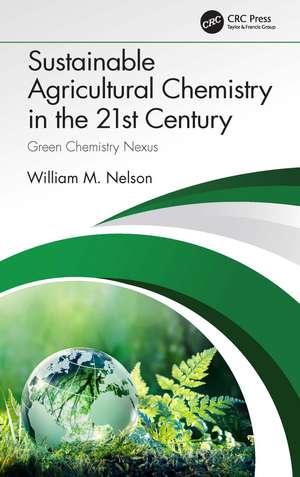Sustainable Agricultural Chemistry in the 21st Century: Green Chemistry Nexus
Autor William Nelsonen Limba Engleză Paperback – 31 mai 2023
Features:
- Explains the necessary role of agricultural chemistry in the sustainability of the world in the 21st century
- Recognizes past practices and future potential, guided by global demand and the four drivers: economic, scientific, regulatory and environmental
- Presents a much needed multi-dimensional approach to the subject
- Demonstrates that agricultural chemistries can and should be leading contributors in discussion on environmental science and chemistry
- Highlights new products, processes, applications and developments in green chemistry, which demonstrates how agriculture is adapting in the new age
| Toate formatele și edițiile | Preț | Express |
|---|---|---|
| Paperback (1) | 572.72 lei 6-8 săpt. | |
| CRC Press – 31 mai 2023 | 572.72 lei 6-8 săpt. | |
| Hardback (1) | 1279.02 lei 6-8 săpt. | |
| CRC Press – 31 mai 2023 | 1279.02 lei 6-8 săpt. |
Preț: 572.72 lei
Preț vechi: 673.79 lei
-15% Nou
Puncte Express: 859
Preț estimativ în valută:
109.60€ • 113.23$ • 91.17£
109.60€ • 113.23$ • 91.17£
Carte tipărită la comandă
Livrare economică 19 martie-02 aprilie
Preluare comenzi: 021 569.72.76
Specificații
ISBN-13: 9780367744588
ISBN-10: 0367744589
Pagini: 312
Ilustrații: 30 Halftones, color; 9 Halftones, black and white; 30 Illustrations, color; 9 Illustrations, black and white
Dimensiuni: 152 x 229 x 17 mm
Greutate: 0.58 kg
Ediția:1
Editura: CRC Press
Colecția CRC Press
ISBN-10: 0367744589
Pagini: 312
Ilustrații: 30 Halftones, color; 9 Halftones, black and white; 30 Illustrations, color; 9 Illustrations, black and white
Dimensiuni: 152 x 229 x 17 mm
Greutate: 0.58 kg
Ediția:1
Editura: CRC Press
Colecția CRC Press
Public țintă
Academic, Postgraduate, Professional, Professional Practice & Development, and Undergraduate AdvancedCuprins
1.Criteria for Sustainable Agricultural Chemistry. 2. Agricultural chemistry in global sustainability. 3. Forces in agricultural chemistry and the need for circularity. 4. Life cycle assessment with circularity. 5. Use of natural resources affecting sustainability. 6. Use of natural resources affecting sustainability. 7. Unsustainable Agricultural Waste Streams. 8. Agricultural Chemistry in the Food, Energy, and Water Nexus. 9. Sustainable Intensive Agriculture. 10. Circularity - Environmental, Chemical, Agricultural. 11. Smart Agriculture through Agricultural Chemistry. 12. Crop Protection and Agricultural Green Chemistry. 13. Sustainable Agricultural Chemistry - The Biorefinery. 14. Epilogue – Building a Sustainable Agricultural Chemistry.
Notă biografică
William M. Nelson is a Research Physical Scientist at the Engineering Research and Development Center for the US Army Corps of Engineers in Vicksburg, MS. He received a B.S. in chemistry from University of North Carolina in Chapel Hill in 1972, an MA in chemistry from Washington University in St. Louis in 1982, and a Ph.D. in organic chemistry from The Johns Hopkins University in Baltimore in 1989, during which time he studied the synthesis and photobiology of analogs of the environmental carcinogen benzo[a]pyrene. After that he did postdoctoral studies in photochemistry at the University of Illinois in Champaign-Urbana. After leading R&D for a small pharmaceutical company, he worked for the State of Illinois, helping companies minimize waste and prevent pollution. Since 1995 he has been involved with Green and Environmental Chemistries while working in the US Environmental Protection Agency, the US Food and Drug Administration, and teaching at colleges and universities. During all this time he has also served as Supervisor, Branch Chief, and mentor to many aspiring scientists. The emphases in his research have been in organic reaction mechanisms, preparation of alternative cleaning technologies, green solvents, photocatalysis and synthesis of energetic compounds. He has jointly authored 2 patent applications and has published/presented more than 40 papers.
Descriere
This book highlights the ways in which science in agriculture is helping to achieve global sustainability in the 21st century, and demonstrates that this science can and should be a leading contributor in discussion on environmental science and chemistry.
